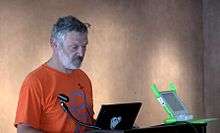Walter Bender
| Walter Bender | |
|---|---|
 Walter Bender, learning fundamentalist | |
| Born | 1956 (age 59–60) |
| Occupation | Executive Director, Sugar Labs |
Walter Bender is technologist and researcher who works in the field of electronic publishing, media and technology for learning. Bender is an alumnus of the MIT Media Lab. He was executive director between 2000 and 2006. From 2006 to 2008, Bender was president of Software and Content for One Laptop per Child where he coordinated the development of software and content including the Sugar interface for the XO-1 Children's Machine computer.
Biography
Walter Bender earned a Bachelor of Arts degree from Harvard University in 1977 and a Master of Science degree from MIT in 1980. For more than 20 years, Bender was head of the MIT Media Lab's Electronic Publishing Group. The Electronic Publishing research group was initiated when Bender joined the Architecture Machine Group (the precursor to the Media Lab) in 1978. The research group is one of the Media Lab's oldest and one of a few that predates the creation of the lab.
Bender's research has attempted to build upon the interactive styles associated with existing media and extend them into domains where a computer is incorporated into the interaction. He has participated in research in the field of electronic publishing, and personalized, interactive multimedia, particularly including news.
Between 2000 and 2006, Bender served as the executive director of the MIT Media Lab. He is a former holder of the Alexander W. Dreyfoos Chair at MIT Media Lab.
Bender took a leave of absence from the Media Lab to work at One Laptop per Child as president of that organization for Software and Content. In this role, Bender oversaw and helped with the development of the Sugar graphical interface. After leaving OLPC in 2008, Bender was one of several co-founders of Sugar Labs to continue development of Sugar.[1]
References
External links
|